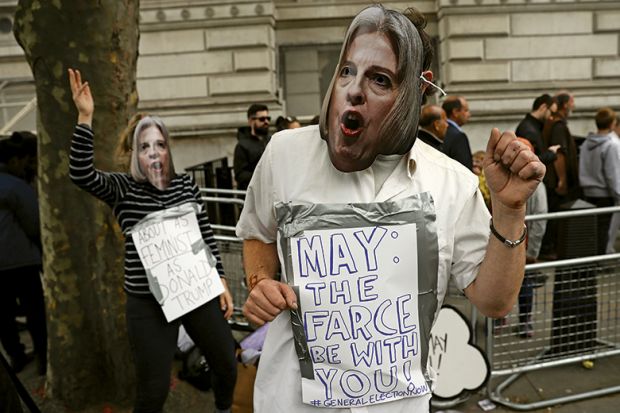The prime minister has finally launched the long-awaited review of post-18 fees and funding. But such a review right now raises more questions than answers, and it brings multiple and complex risks for Theresa May and her party that are not easily controlled or mitigated.
Clearly, the government recognises the political intricacy and sensitivity of the many issues at stake here and has gone for a government-led review – supported by an independent, external chair and panel. In 2010, Lord Browne of Madingley led a largely independent panel with the historic £9,000 fee cap proposal coming subsequently from government ministers Lord Willetts and Sir Vince Cable.
But what are the challenges for this review, and where will it lead?
First, as many have pointed out, the premise that young people voted Labour in droves in the 2017 general election because of tuition fees has been largely debunked by the British Election Study. And it is also difficult to believe that students who are opposed to fees will be won over by a new set of probably rather complex arrangements, at best only slightly less burdensome than the current ones.
In any event, whatever the review’s outcome and however it is spun to young people, it is highly likely that at least some options that potential students currently have will be taken away from them – be it access to courses no longer economically viable, or access to university itself. Not content with depriving young people of the right to work and live across the European Union, there is the prospect of another political project denying them opportunity to study the arts and social sciences if such courses fold.
Second, it is not just the outcomes of the review that will take a political toll on the Tories.
The announcement of a year-long review, timed to produce policies that can be fed into the next Conservative general election manifesto, can surely not work well for the party’s popularity during the review period itself.
Given that, in opposition, Jeremy Corbyn and the Labour Party can simply sit on the sidelines repeating the manifesto mantra of “we will abolish fees”, every proposal that is leaked from the review, or put to it by a pundit, will inevitably fall short of that simple and attractive model.
In a sense, this review is a bizarre 12-month, government-funded project to keep in the news an issue on which it will always poll second-best among young people. It would be like a Labour government having a review titled “How best to tax the middle classes in marginal constituencies”.
Third, given that many MPs, Lords and commentators have been keen to give their views when there has been no review, the exercise will fuel contributions from across the full political spectrum.
It is inevitable that at some point a Tory backbencher or thinktank will float the idea of commercial loans on market terms for at least some students – no doubt badged as a pilot. It will receive little or no support from a government trying to win back young voters and their families. But when the debate is in part about reducing the cost to the public purse, the babble on privatisation, commercialisation and profit will find its way on to the Sunday morning chat circuit – they just can’t help themselves. This will further alienate young people and their families.
Fourth, events, dear boy, events. It is conceivable that May will leave Downing Street while the review is in progress. A Tory leadership election just as the review’s proposals are coming to the boil will add spice to any contest, and to the review. No doubt Boris Johnson will advocate greater cuts to tuition-fee levels even if his brother Jo was removed from the job of universities minister in part for opposing this very review. How Jacob Rees-Mogg might weigh in on the university debate is a matter for speculation: he might restrict himself to publicly lamenting the 1970s reforms to Greats. Education secretary Damian Hinds himself might be in the running; but if the review is not going well, where would that leave him?
Fifth, the review itself will bring out the usual contradictions on ideas about fees, funding and fairness, with risks to public understanding and transparency. We saw this on the day the review was launched. While the prime minster was arguing that university degrees needed to be better value for money, Hinds was arguing, “If you’ve benefited from a university degree, we know that typically people earn over £100,000 more over the course of their life…then you should be making a big part of that investment.”
Overall, this review might well be be bad news for universities and for learners. However, it might also be bad news for Conservatives who seek to win over young voters and students generally.
It will be a long, bumpy road to the final proposals around spring 2019. And a year is a long time in politics.
Patrick McGhee is assistant vice-chancellor at the University of Bolton. He writes here in a personal capacity.
Register to continue
Why register?
- Registration is free and only takes a moment
- Once registered, you can read 3 articles a month
- Sign up for our newsletter
Subscribe
Or subscribe for unlimited access to:
- Unlimited access to news, views, insights & reviews
- Digital editions
- Digital access to THE’s university and college rankings analysis
Already registered or a current subscriber? Login







